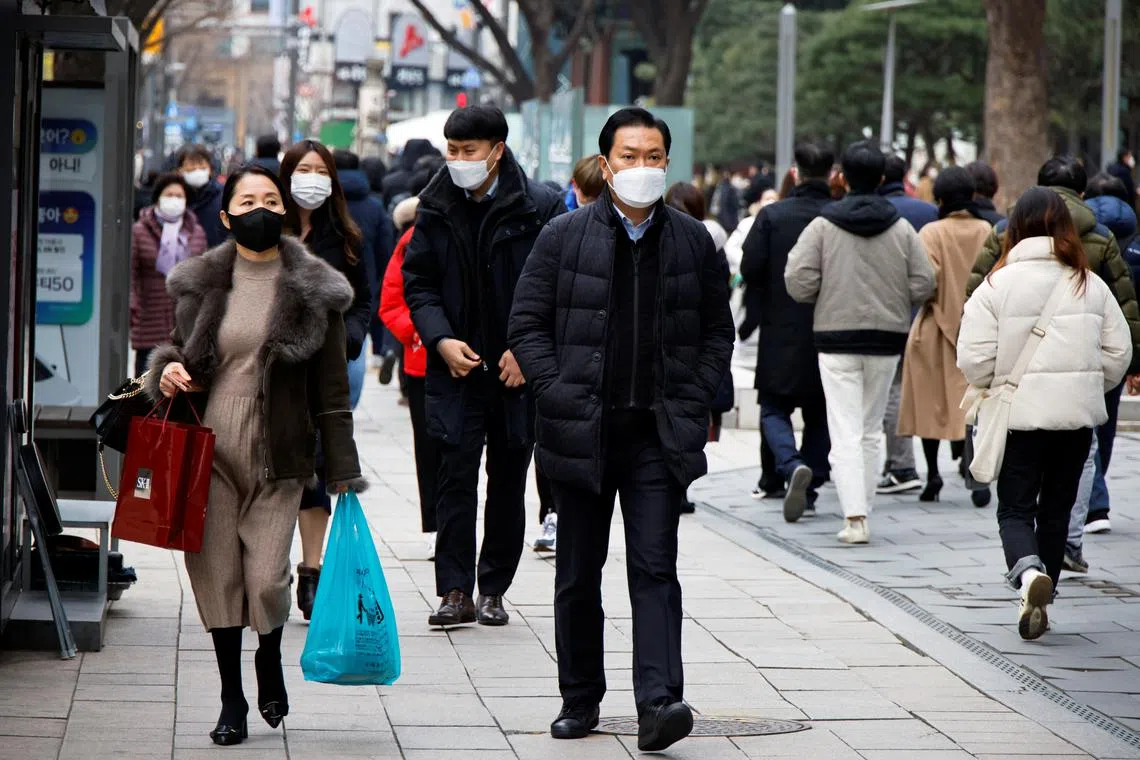Covid-19 surge in South Korea fuels fears of hidden spread with less data, fewer tests
Sign up now: Get ST's newsletters delivered to your inbox

The South Korean health authorities have been reporting a steady rise in cases since the beginning of July as part of a wave that is expected to peak later in August.
PHOTO: REUTERS
Follow topic:
SEOUL – The recent surge in Covid-19 infections in South Korea is stoking concerns of hidden, unchecked community spread, intensified by reduced data collection from government agencies and a decline in testing rates.
The Korean health authorities have been reporting a steady rise in cases since the beginning of July as part of a summertime wave that is expected to peak later in August. This peak would coincide with the end of the holiday season and the return of students to schools.
The number of patients hospitalised with Covid-19 at 220 hospital-level medical institutions stood at 1,357 in the second week of August, according to the Korea Disease Control and Prevention Agency (KDCA) on Aug 14.
This reflected a sharp rise from 148 in the second week of July to 226 in the third week and 475 the following week. The corresponding figure for the first week of August was 861. Most hospitalised patients were more than 65 years old.
The KDCA explained that the summer wave is mainly spurred by a Covid-19 variant called KP.3, which has become the dominant strain in South Korea and is spreading quickly elsewhere around the globe. KDCA chief Jee Young-mee predicted that the virus will likely remain an infectious disease that spreads during the summer and winter.
However, the health authorities no longer collect data as they used to, making tracking infected patients and their contact history more challenging.
Also, people test less, even if they feel the symptoms. Some mistake the virus for a cold as they usually share similar symptoms, such as a runny nose, cough or sore throat.
Moreover, corporate workers are often told to commute to work wearing facial covers when infected, rather than allowing them to work from home.
Most measures to contain the virus were scrapped in May 2023, when the South Korean government announced it was exiting the state of Covid-19 national emergency and dropped its remaining antivirus mandates the following month.
Now, the KDCA advises self-isolation for patients for five days from the day of diagnosis, though it is no longer mandated. Before, there was a mandatory self-isolation period of seven days.
In the light of the resurgence, the authorities said they will secure and distribute additional Covid-19 treatments starting this week so that these can be delivered to pharmacies and allow those infected to access them easily.
The Ministry of Food and Drug Safety is currently monitoring how well self-testing kits are being supplied, as well as how they are being produced and distributed. Manufacturers plan to produce more than five million Covid-19 self-test kits by the end of August.
The KDCA plans to ensure that additional Covid-19 and influenza vaccines can be administered together in October, while the Education Ministry will recommend that students with Covid-19 symptoms recover at home.
In addition, the government has set up a consultative body with experts to discuss the virus trend and antivirus measures regularly, and held its first meeting on Aug 13. Officials have also expanded the response team against Covid-19 and are closely following the virus’ mutations, hospitalisation trends and developments overseas.
Healthcare experts have underscored the importance of adhering to preventive measures to control the spread of the virus, shrugging off the public’s woes regarding the resurgence.
“People staying indoors with windows closed, visiting crowded places during the vacation season and travelling abroad are likely drivers of summer surges as the KP.3 variant spreads quickly. Also, medical institutions are no longer required to report confirmed patients to (the) health authorities, lowering tracking levels,” said family medicine professor Shin Hyun-young of Seoul St Mary’s Hospital.
“But this can be controlled if people mask up in densely populated areas and avoid catching and spreading droplets, which reduces the risk of the spread,” Prof Shin added, noting that the resurgence is not happening at an alarming pace.
Professor Chun Eun-mi, a lung specialist at Ewha Womans University Medical Centre, highlighted the importance of testing, especially among those vulnerable to infection, as it is critical in containing the spread.
Those who are “older, immunocompromised or battling chronic illness such as stroke or diabetes are at a much higher risk of getting the virus”, but they tend to overlook the symptoms, thinking that these are simply due to a fever or a mild illness, Prof Chun said.
“Antigen rapid tests and treatments are available at pharmacies, so I recommend testing for Covid-19 if you feel any signs,” she added. THE KOREA HERALD/ASIA NEWS NETWORK

